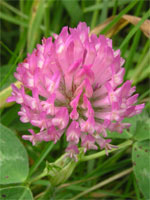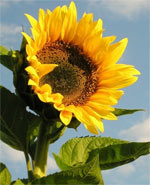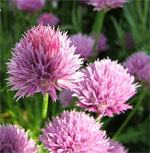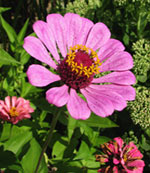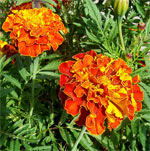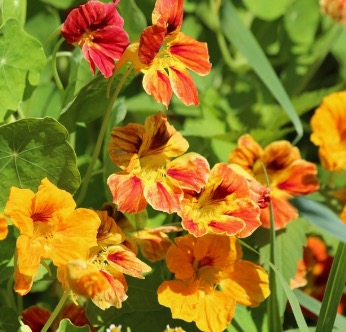Why plant flowers in the vegetable garden? Flowering plants attract beneficial insects and birds, suppress invasive weeds, help prevent soil erosion, discourage unwanted insects from destroying crops, and improve the soil. Planting flowers among or alongside rows of vegetable plants can be mutually beneficial. However, flowers with large, showy blooms aren't always best; so a gardener should concentrate on what benefits each plant brings to the garden.
 Marigolds, petunias, and alyssum here offer some beautiful color in amongst all the green in a typical vegetable garden.
Marigolds, petunias, and alyssum here offer some beautiful color in amongst all the green in a typical vegetable garden.
So what are some easy flowers to grow that will improve your vegetable garden?
Clover
Clover is one of the easiest flowers to grow in the garden, and one of the most beneficial. In addition to attracting bees and other pollinators, clover improves the soil in a variety of ways. Since clover recovers quickly from foot traffic, it can be planted directly on walkways. This helps to prevent soil erosion while saving the planting beds for vegetables and other plants.
Clover's taproot, which can grow three feet long or longer, helps to loosen the soil and bring nutrients to the surface that would otherwise remain unused. All varieties of clover are legumes, meaning that they take nitrogen gas from the air and convert it into a nitrogen compound that is easily used by plants. Once the clover dies, it releases the nitrogen into the ground for the benefit of surrounding plants.
Sunflowers
Sunflowers attract a wide range of beneficial insects, as well as birds; which use the tall stalks as perches while hunting for cabbageworms, various caterpillars, and other pests. One caution however: Many varieties of sunflowers grown for flower arrangements do not produce pollen because pollen will stain. Without pollen, these specially bred flowers do not attract beneficial insects. Make sure the variety you plant produces pollen.
Alliums, Onions, Garlic, and Chives
Most flower gardeners would turn up their collective noses at the flowers produced by onions and garlic, as they are generally small, plain, and do not produce a sweet scent. However, all alliums, including onions, garlic, and chives, have a pungent odor that seems to deter all but the most determined deer and rabbits. Therefore, including members of the allium family in a vegetable garden can help to protect it from the predations of these larger animals.
The Daisy Family
This includes zinnias, asters, and calendula. Daisies are hardy perennials that are easy to grow in almost any soil. They attract pollinators such as bees, butterflies and moths, and add color to the garden. In addition, calendula can be used as a "trap crop" by attracting aphids away from vegetable plants. Zinnias are annuals and can add a wonderful burst of color; pollinators love them, too.
Marigolds
Marigolds are very easy to grow and come in a wide range of yellows, oranges, and even reds. They're even great companion plants to keep pests away from such vegetables as basil, cucumbers, eggplant, kale, squash, and tomatoes and potatoes. They act as insect deterrents which is a great benefit when planted next to cucumbers and other squash related veggies.
Nasturtiums
Nasturtiums are some of the easiest annual flowers to grow. The seeds are relatively large and easy to handle. You can plant them by just pushing individual seeds down a couple inches in your soft garden soil. And they don't require any extra attention from what you're doing to maintain your veggie plants. The flowers are even edible, and a great visual addition to summer salads (but make sure to check for bugs first!). You do have to be a bit careful where you plant them as they can sprawl quite prolifically. In amongst your squash vines is often a good place.
Adding flowers to your vegetable garden is a simple, often beautiful way to increase your crop yield. So go ahead and mix flowers with your veggies. You'll be glad you did!
